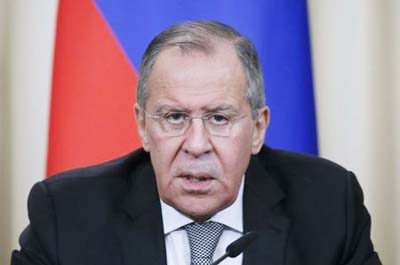
Reuters, Moscow :
Russian Foreign Minister Sergei Lavrov spoke by telephone with his Iranian counterpart Mohammad Javad Zarif about preparations for a Russian-hosted Syrian People’s Congress, the Russian Foreign Ministry said on Friday in a statement.
European Union powers on Thursday urged U.S. President Donald Trump to endorse a key nuclear agreement with Iran insisting that the deal is essential for international security.
The foreign ministers of Britain, France and Germany threw their weight behind the pact limiting Iran’s nuclear ambitions and insisted that the Islamic Republic is respecting it.
“There is no indication today that could call into doubt Iranian respect of the agreement,” French Foreign Minister Jean-Yves Le Drian told reporters in Brussels, after a meeting between the Europeans and their Iranian counterpart Javad Zarif.
Le Drian called on all parties to uphold the agreement, noting that “our American allies should respect it as well. There is no particular reason for any rupture.”
Under the accord, Iran slowed its nuclear program in exchange for an easing of international economic sanctions. Trump is expected to decide by Friday whether to extend the sanctions relief or re-impose the restrictions his predecessor, President Barack Obama, suspended two years ago.
British Foreign Secretary Boris Johnson also noted that no one has put forward a plan that might be as effective in curbing Iran’s nuclear ambitions.
“It’s incumbent on those who oppose the (deal) really to come up with that better solution, because we haven’t seen it so far,” he said.
However, Johnson said it is “legitimate and right” to focus in parallel on what Iran should do to ease the crises in Yemen and Syria.
Officials from major world powers and Iran meet roughly every three to four months to assess implementation of the deal, which is monitored by the world’s nuclear watchdog, the International Atomic Energy Agency.
The 2015 pact is underpinned on the U.S. side by a presidential waiver of nuclear-related sanctions on Iran’s central bank.
Russian Foreign Minister Sergei Lavrov spoke by telephone with his Iranian counterpart Mohammad Javad Zarif about preparations for a Russian-hosted Syrian People’s Congress, the Russian Foreign Ministry said on Friday in a statement.
European Union powers on Thursday urged U.S. President Donald Trump to endorse a key nuclear agreement with Iran insisting that the deal is essential for international security.
The foreign ministers of Britain, France and Germany threw their weight behind the pact limiting Iran’s nuclear ambitions and insisted that the Islamic Republic is respecting it.
“There is no indication today that could call into doubt Iranian respect of the agreement,” French Foreign Minister Jean-Yves Le Drian told reporters in Brussels, after a meeting between the Europeans and their Iranian counterpart Javad Zarif.
Le Drian called on all parties to uphold the agreement, noting that “our American allies should respect it as well. There is no particular reason for any rupture.”
Under the accord, Iran slowed its nuclear program in exchange for an easing of international economic sanctions. Trump is expected to decide by Friday whether to extend the sanctions relief or re-impose the restrictions his predecessor, President Barack Obama, suspended two years ago.
British Foreign Secretary Boris Johnson also noted that no one has put forward a plan that might be as effective in curbing Iran’s nuclear ambitions.
“It’s incumbent on those who oppose the (deal) really to come up with that better solution, because we haven’t seen it so far,” he said.
However, Johnson said it is “legitimate and right” to focus in parallel on what Iran should do to ease the crises in Yemen and Syria.
Officials from major world powers and Iran meet roughly every three to four months to assess implementation of the deal, which is monitored by the world’s nuclear watchdog, the International Atomic Energy Agency.
The 2015 pact is underpinned on the U.S. side by a presidential waiver of nuclear-related sanctions on Iran’s central bank.

